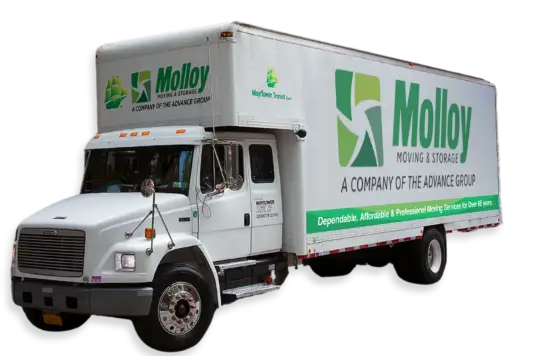If you’re the parent of a child with a physical disability, you’re usually equipped to cope with whatever life throws at you. But if this is the first time moving with your child, the transition can be a little overwhelming. Here are five tips from moving experts at Molloy to help make your move—and your child’s transition into a new location—as comfortable and seamless as possible.
- Experts and parents alike agree: Accessibility gets top priority. Finding a home that hits all of your criteria is important—ensuring the house is adaptable for your child even more so. Features to look for in a new home include:
- Relatively flat grounds with paved walkways from parking and sidewalk areas to the entrance of the house
- A ground-level entrance or one with a one- or two-step entrance clear of any major obstructions, such as trees, bushes, building corners.
- Doorways and hallways wide enough to fit wheelchairs and other necessities.
- At least one bathroom with a 32-inch door opening and clear 5-feet x 5-feet floor space.
- A kitchen that allows easy wheelchair mobility; U-, L-shaped or open floor plans are recommended.
- Research the schools in the area. When children change schools, it’s always a bit of an adjustment—but for a child with a physical disability, you’ll want to make sure the adjustment period is as short as possible. Although public schools are required by federal laws to offer free appropriate public education (FAPE) to all children, it is important to find the educational institution that best fits your child’s needs. This includes ensuring the new school is prepared to follow your child’s current Individualized Education Program (IEP). School review sites and local forums may help in discerning which school is right for your child.
- Ask for assistance. Just as your moving company assists you with getting your belongings packed, moved and unpacked so you can feel settled, it’s essential you seek assistance from people in your child’s life to help your child feel settled. Ask your child’s current teachers, therapists and/or caregivers to write a letter to the new school describing your child—strengths, weaknesses and approaches that have been successful. This ensures your child’s new teachers, therapists and other caregivers will be one step ahead of the game, helping your child feel safe and comfortable in the new surroundings. You should also reach out to your child’s doctor to ask for recommendations for providers in your new location.
- Organization is key. Over the months leading up to your move, there will be a lot of calls to make, emails to send, papers to gather—and making a checklist will help you stay organized. To prevent losing any important records or feeling overwhelmed by the number of documents, keep them safe in a filing box. Some of your child’s records that should be obtained at least six weeks before the move include:
- A physical conducted by your child’s current doctor.
- Medical reports of any prescription medicine or for therapy, as well as from many specialists your child is seeing, such as neurologists or allergists.
- Dental records.
- Your child’s Individualized Education Program (IEP). If the IEP needs to be renewed around the time of your move, request a new IEP be written earlier, so your child can be accurately placed in the new school. This ensures the new IEP is signed and copies are sent to the new school.
- A triennial evaluation for special education services. If a triennial evaluation is due, request the evaluation be completed earlier than planned. Again, this ensures you will be able to obtain signed copies for yourself and the new school.
- Pack an overnight bag before the big move. No one likes to feel like they don’t have what they want or need, but when moving with a child with a physical disability, keeping his or her necessities close at hand is crucial. Packing clothes is a given, but you’ll also want to pack items such as prescriptions, preferred games or toys, a book and some favorite snacks. This way, you’re prepared for any unforeseen events that may put a dent in an otherwise smooth move.
Want to make your move effortless not just for your child, but for you—and every member of your family? Contact the relocation specialists at Molloy today.



